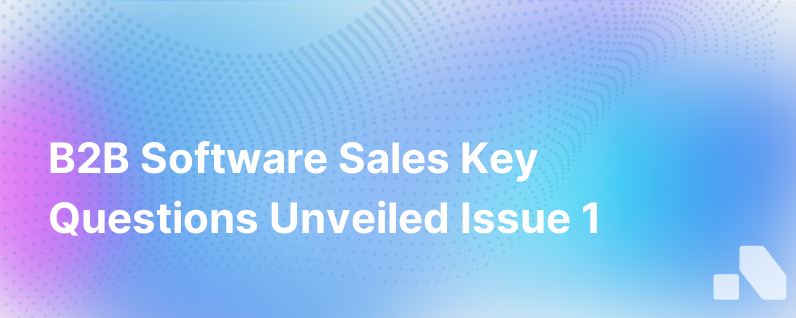B2B Software Sales Questions Issue 1
Published on October 14, 2023 by Sawyer Middeleer
Introduction
In the complex and intricate world of B2B software sales, the ability to ask the right questions is tantamount to setting the cornerstone of a successful sales strategy. Questions are the windows through which sales professionals can peer into the dynamic needs and pain points of their potential clients. These inquiries, when formulated and timed correctly, can open doorways to deeper insights, fostering trust, and ultimately, clinching pivotal deals.
In the inaugural issue of "B2B Software Sales Questions," we embark on an exploration of the key questions that can unlock meaningful conversations and accelerate the sales cycle. Understanding both the question and its purpose can equip salespersons in crafting a tailored experience that resonates with the prospect's ambitions and hurdles.
The Preliminary Probe
Before the deep dive, let's establish the stage with some diagnostic questions. Begin by mapping the fundamental understanding of the business landscape with queries like:
- What are the business objectives for the upcoming quarter/year?
- Could you walk me through the current workflow and tools in place?
Knowing the answers to these preliminary questions allows a sales professional to tailor their pitch, ensuring that it aligns with the prospect's overarching goals and technology infrastructure.
Unearthing Pain Points
Pain points are the catalysts of the software sales process—they trigger the search for a solution. The key is to gently coax these pain points to surface with questions such as:
- What challenges are you currently facing with your existing solution?
- How do these challenges impact your day-to-day operations?
The motive behind these questions is not merely to identify the pain points but to measure their impact, offering context to how a B2B solution could alleviate those precise sticking areas.
Identifying Decision-Makers and the Buying Process
Understanding the hierarchy and the decision-making process is crucial. Pertinent questions here might include:
- Who will be directly involved in the decision-making process?
- Can you describe the steps in your evaluation and purchasing process?
These questions are designed to glean insights into the organizational structure and the roadmap to a sale. It's the acknowledgment that, in B2B sales, one is not selling to an individual but navigating a web of stakeholders.
Evaluating Technical Compatibility and Integration
The seamless integration of new software with existing systems can be a make-or-break facet. The conversation can revolve around technical details with questions like:
- What are the key technical requirements for your new solution?
- Are there any specific integrations or APIs that you need the software to support?
These questions are essential for assessing the feasibility of a potential deployment and ensuring the prospect’s technical needs can be met without friction.
Assessing Value and ROI
Every prospect wants assurance that their investment will yield substantial returns. Strategically crafted questions uncover the quantifiable value expected from a new software purchase:
- What key metrics will you use to measure the success of the new solution?
- How do you see this investment influencing your organizational productivity or revenue?
Tapping into these considerations translates product features into tangible business outcomes, a vital connection in the B2B selling process.
Competitor Awareness and Differentiation
Prospects often consider multiple options. One must guide the conversation to understand perceptions and differentiate the offering with curiosities like:
- How does our solution compare with others you are considering?
- What features or services are most important to you in selecting a software?
These questions allow a sales rep to refine their value proposition and tactically address areas where their solution might outshine the competition.
Timeline and Follow-up
Timing can significantly influence the sale, thus understanding the prospect's timeline is imperative:
- What is your timeline for implementing a new solution?
- Can you walk me through any critical deadlines that might affect this decision?
Then, seamlessly transition into tactical follow-up queries to maintain momentum and next steps with questions such as:
- What additional information can I provide to assist in your decision-making?
- When would be a convenient time to follow up on our discussion today?
Strategic Wrap-up
Crafting a strategic conclusion is about reinforcing value, setting expectations, and solidifying next steps. Questions like the following can establish a clear pathway forward:
- Based on our conversation, how well does our solution align with your needs?
- Are there any outstanding concerns or questions that I can address right now?
The aim here is to cement the connection between the prospect's needs and the software offering, while providing immediate value by addressing any lingering hesitations.
Conclusion: The Importance in the Inquiry
Mastering the art of questioning within B2B software sales is not just about asking more questions, it's about asking better, more transformative ones—those that incite dialogue, unearth hidden objections, and frame your solution in the context of the client's specific aspirations and challenges.
As we conclude this comprehensive anatomization of the question constructs in B2B software sales, it’s essential to consider that behind every question lies an intention to understand and add value. Whether you're a seasoned professional or a novice in the field, integrating these question archetypes into your sales dialectic can fortify the foundation of your client conversations, steering them towards productive and profitable outcomes.